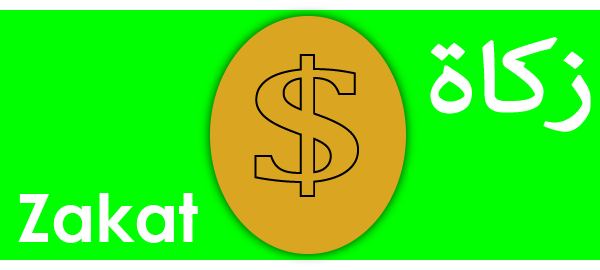
Zakat is ia an annual Islamic charity that is paid by all muslims that meet the requirements. It’s similar to a tax system enforced by world governments but it’s based on wealth and savings rather than annual earnings. Zakat is considered a welfare program that helps the poor and provides necessary services for the people. Also, Zakat is one of the main pillars of Islam and it is a commandement by Allah, the All-Wise and the One who knows what’s best for humanity.
Benefits of Paying Zakat
The term Zakat origins from the word Zaka in Arabic which has two meanings: purification and enhancing/increasing. So when people give their obligated zkat, they are actually not losing money but rather purifying and increasing their wealth and earnings. In chapter Al-Tawba, verse 103, Allah ordered the prophet Muhammad (PBUH): “Take from their money charity so it can cleanse them and purify them”.
Who pays Zakat?
if someone’s wealth and savings reaches a nisab (threshold) then it is obligatory to pay the Zakat. According to the majority of Islamic scholars, the nisab equals to 85 grams of gold or 595 grams of silver. If you own gold then you use the gold nisab and if you own silver then you use the silver nisab. But since our savings these days is in cash then we calculate based on the value of cash we own. So do you select gold or silver to calculate the value of your Zakat? There are two sides for this between Islamic scholars. One side says that you use the lower amount which is silver, and the other says you use gold. I highly suggest you consult with an Islamic scholar in your local area as he will be able to give you the correct answer based on your financial situation.
How to calculate the Zakat?
Wealth is divided into many categories which include physical money savings, gold, silver, stocks, agricultural goods, investments, trades, etc. The zakat is paid once a year (based on a lunar calendar) and it is ONLY 2.5% of your wealth. A brief example: let’s say you earned $10,000 and you don’t need to spend this money so you are saving it and it is Ramadan 2016. If Ramadan 2017 arrives and you still have that $10,000 saved up then you must pay zakat on this amount ($10,000 X 0.025 = $250). If this amount increased or decreased during that year (even if it’s one week before the due date) then you do the same calculation for the new amount. If you do not have wealth and you are just able to cover your monthly expenses with the money you have then you are exempted from paying Zakat. Please make sure when you are doing your zakat to consult with your local masjid imams because some aspects of Zakat can be difficult especially when it comes to farmers, investors, and traders.
Who is eligible to receive Zakat?
This is clearly shown in Chapter Al-Tawba, verse 60: “Sadaqat (charities) are only for the poor and the needy and those who are in charge thereof, those whose hearts are to be reconciled and to free those in bondage, and to help those burdened with debt, and for expenditure in the way of Allah, and for the wayfarer. This is an obligation from Allah, Allah is All-Knowing, All-Wise”. You can give zakat to anyone you personally know if they fall within the criteria (besides your grandparents/parents/wife/children) or you can find a Zakat box in every mosque/Islamic institution.
One thing that I love about Islamic Zakat is that it’s very reliable, unlike those charitable organizations you see these days where half of your donations is spent on their salaries and you don’t even know where the rest really goes. As a Muslim, you can put the charity money right in the person’s hand (who is eligible) and the only one who can evaluate your intentions is Allah. Another point, to be clear on everything, the Zakat amount you owe is no longer yours and if you decide not to give it to an eligible person then know that it’s haram (forbidden) on you and that you are committing a MAJOR sin. It’s like stealing from the poor and causing them to suffer in their lives. No one will see your actions or judge you, but you are accountable for this on the day of judgement.
What is Zakat Al Fitr?
Zakat Al Fitr is a small charity that is obligatory on all muslims (regardless of age) in the month of Ramadan. Mosques or Islamic institutions that collect Zakat Al Fitr have to distribute the money among the poor or others in need before the end of Ramadan. The amount for this charity is usually the average price of a meal in the area where the Zakat is given. Let me use an example to clear the picture; Let’s assume that you’re a married man/woman with 3 young children (1, 3, and 5 years old) and living in the Toronto area in Canada. Based on this scenario, the husband should give Zakat Al-Fitr for 5 people and the average price of a meal in Toronto is $10, and therefore, the total amount would be $50.
Sadaqah in Islam
The non-obligatory/voluntary sadaqah (charity/donations) has high rewards in this life and the hereafter. Even if you are a low-income person and you want to gain some precious good deeds then it is your opportunity to give sadaqa (since you are exempted from giving the obligatory zakat). In Islam, sadaqa is not only money but can be defined in other ways such as donating your time, helping others in any way, educating others, listening to others, comforting others or even smiling at others. You should know that giving a penny may be nothing to you, but on Allah’s scale it is very high. In chapter Al-Munafiqoon, verse 10: “And spend (in the way of Allah) from what we have provided you before death approaches one of you and he says: My Lord if only You would delay me for a brief term so I would give charity and be among the righteous”. When a person dies, his/her vision becomes solid and clear. The verse refers to the person who wanted to return to life only to give charity because after death he realized how important it is and how much it would have changed his status on judgment day. May Allah make us among those who give Zakat and Sadaqah.
The Secret Law of Zakat and Sadaqah
There are many laws that exist on this earth that work in a systematic way without any human intervention such as gravity, climate, etc. Similarly, zakat and sadaqah have their own secret law or formula that Allah put on this earth to reward the ones who give: “The example of those who spend their wealth in Allah’s way is similar to that of a grain which has sprouted seven stalks and in each stalk are a hundred grains; and Allah may increase it still more than this, for whomever He wills; and Allah is Most Capable, All Knowing” (Al-Baqarah, verse 261). This law was discovered by many people in this world (regardless of their religious beliefs) ans they’re taking advantage of it to increase their wealth. I came across a video of a well-known business/marketing consultant named Dan Kennedy where he explained the miracle of this law from his own experience:
